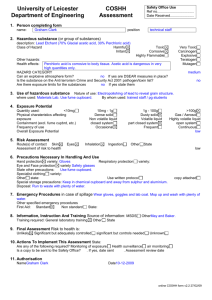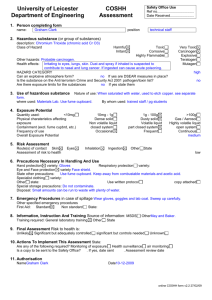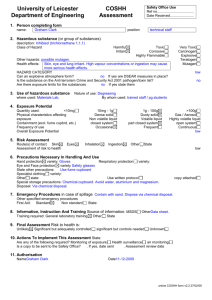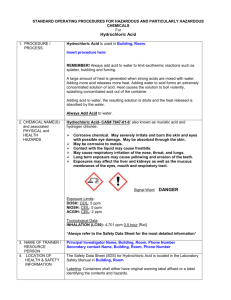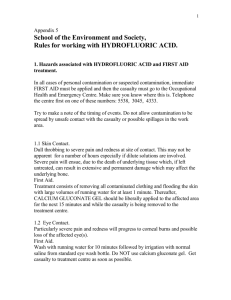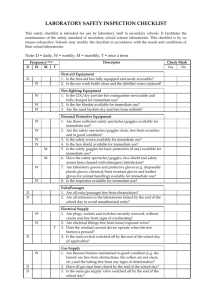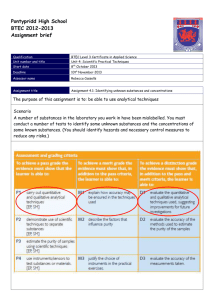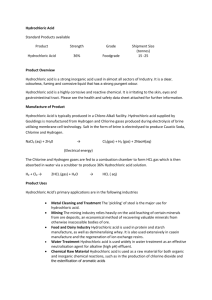SWP for 32_ HCl decanting (2)
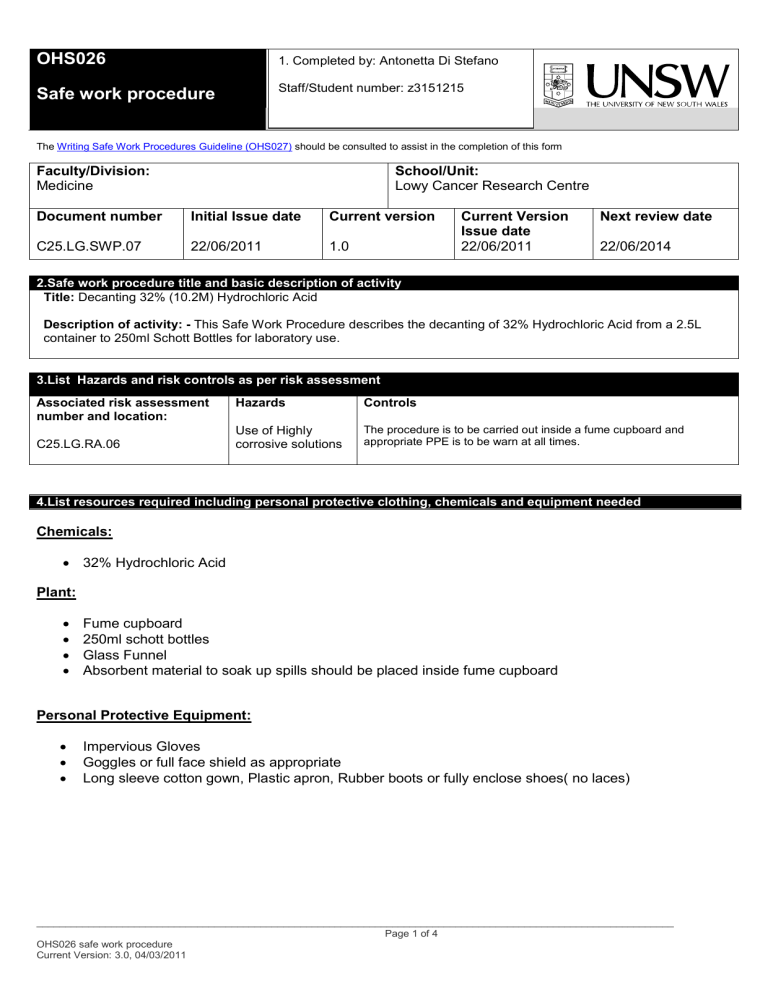
OHS026
Safe work procedure
1. Completed by: Antonetta Di Stefano
Staff/Student number: z3151215
The Writing Safe Work Procedures Guideline (OHS027) should be consulted to assist in the completion of this form
Faculty/Division:
Medicine
Document number
C25.LG.SWP.07
Initial Issue date
22/06/2011
School/Unit:
Lowy Cancer Research Centre
Current version
1.0
Current Version
Issue date
22/06/2011
Next review date
22/06/2014
2.Safe work procedure title and basic description of activity
Title: Decanting 32% (10.2M) Hydrochloric Acid
Description of activity: - This Safe Work Procedure describes the decanting of 32% Hydrochloric Acid from a 2.5L container to 250ml Schott Bottles for laboratory use.
3.List Hazards and risk controls as per risk assessment
Associated risk assessment number and location:
C25.LG.RA.06
Hazards
Use of Highly corrosive solutions
Controls
The procedure is to be carried out inside a fume cupboard and appropriate PPE is to be warn at all times.
4.List resources required including personal protective clothing, chemicals and equipment needed
Chemicals:
32% Hydrochloric Acid
Plant:
Fume cupboard
250ml schott bottles
Glass Funnel
Absorbent material to soak up spills should be placed inside fume cupboard
Personal Protective Equipment:
Impervious Gloves
Goggles or full face shield as appropriate
Long sleeve cotton gown, Plastic apron, Rubber boots or fully enclose shoes( no laces)
_______________________________________________________________________________________________________________
Page 1 of 4
OHS026 safe work procedure
Current Version: 3.0, 04/03/2011
5.List step by step instructions or order for undertaking the task
1. Ensure you are wearing all appropriate PPE before removing Hydrochloric acid
2. Ensure Hydrochloric Acid container has no signs of leaking and remove from corrosives cupboard
3. Place hydrochloric acid in fume cupboard (ensure fume cupboard is not overly full with other vaporous material)
4. If needed, place a glass funnel into the opening of a 250ml schott bottle.
5. Pull down sash of fume cupboard ensuring arms can still move freely inside the cupboard
6. Open lid of Hydrochloric acid container
7. Carefully pour the acid into the 250ml container
8. Allow acid to evaporate from glass funnel before removing from hood
9. Close all lids and label 250ml bottles appropriately
10. Place all decanted and stock hydrochloric acid bottles in corrosives cupboard ensure stock bottles are bunded inside the corrosive cupboard
6.List emergency shutdown procedures
In the event of an emergency use emergency stop button of fume cupboard to shut down
7.List Emergency procedures for how to deal with fires, spills or exposure to hazardous substances
Skin Contact: Wash affected area with soap and water.
Eye Contact: Rinse eye with copious amounts of water, taking care not to contaminate unaffected eye. Seek medical attention
Ingestion: Do not induce vomiting, rinse mouth with water and seek medical attention
Inhalation: Remove from contaminate area. Apply artificial respiration if not breathing. Seek medical attention
Notes for physician: Treat symptomatically as for strong acids
Suitable extinguishing media: Extinguish fire with water fog, foam or dry chemical powder
Special Protective equipment for fire fighters: Fire fighters should wear full protective clothing and self breathing apparatus operated in positive pressure mode
8.List Clean up and waste disposal requirements
Dispose of unwanted containers and hydrochloric acid using UNSW chemical waste removal policy
In the event of a spill, Increase ventilation. If possible contain the spill using inert absorbent material and place into a secondary container
All materials used to mop up a spill are to be disposed of as chemical waste.
9.List legislation used in the development of this SWP
NSW OHS ACT 2000
NSW OHS Regulations 2001
MSDS for Hydrochloric Acid 32% (Ajax)
10a.List competency required – qualifications, certificates, licensing, training - e.g. course or instruction:
UNSW Laboratory Safety Awareness training or equivalent
UNSW Occupational Health & Safety Awareness training or equivalent
UNSW Hazardous Substances training or equivalent
_______________________________________________________________________________________________________________
Page 2 of 4
OHS026 safe work procedure
Current Version: 3.0, 04/03/2011
10b. List competency of Assessor
11.Supervisory approval, And review
Supervisor: Dr David Coomber Signature:
Responsibility for SWP review: Antonetta Di Stefano Date of review: 22/06/2014
12.SWP Sign off sheet
SWP name and version: Decanting 32% (10.2M) Hydrochloric Acid (Version 1.0)
In signing this section the assessor/ authorisor agrees that the following persons are competent in following this
SWP
Name Signature Date
Competent
Name of Assessor/Authoriser Assessor/Authoriser signature
_______________________________________________________________________________________________________________
Page 3 of 4
OHS026 safe work procedure
Current Version: 3.0, 04/03/2011
_______________________________________________________________________________________________________________
Page 4 of 4
OHS026 safe work procedure
Current Version: 3.0, 04/03/2011
